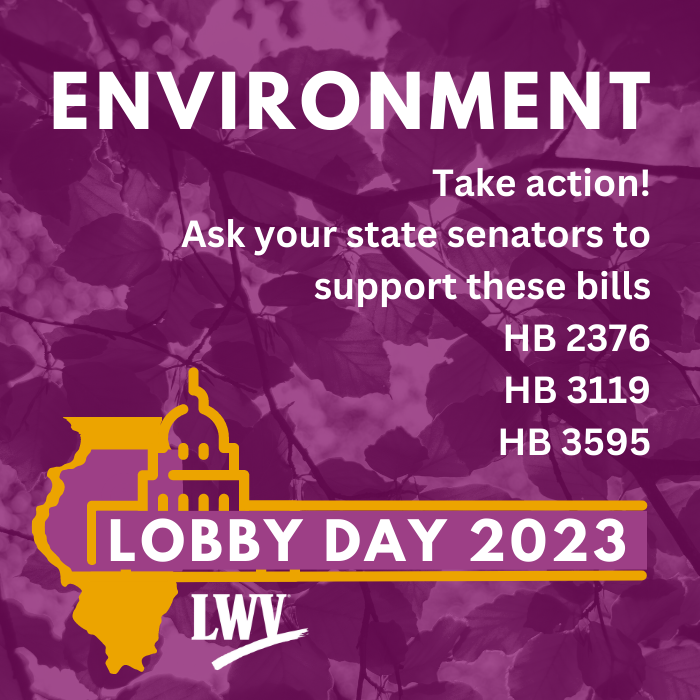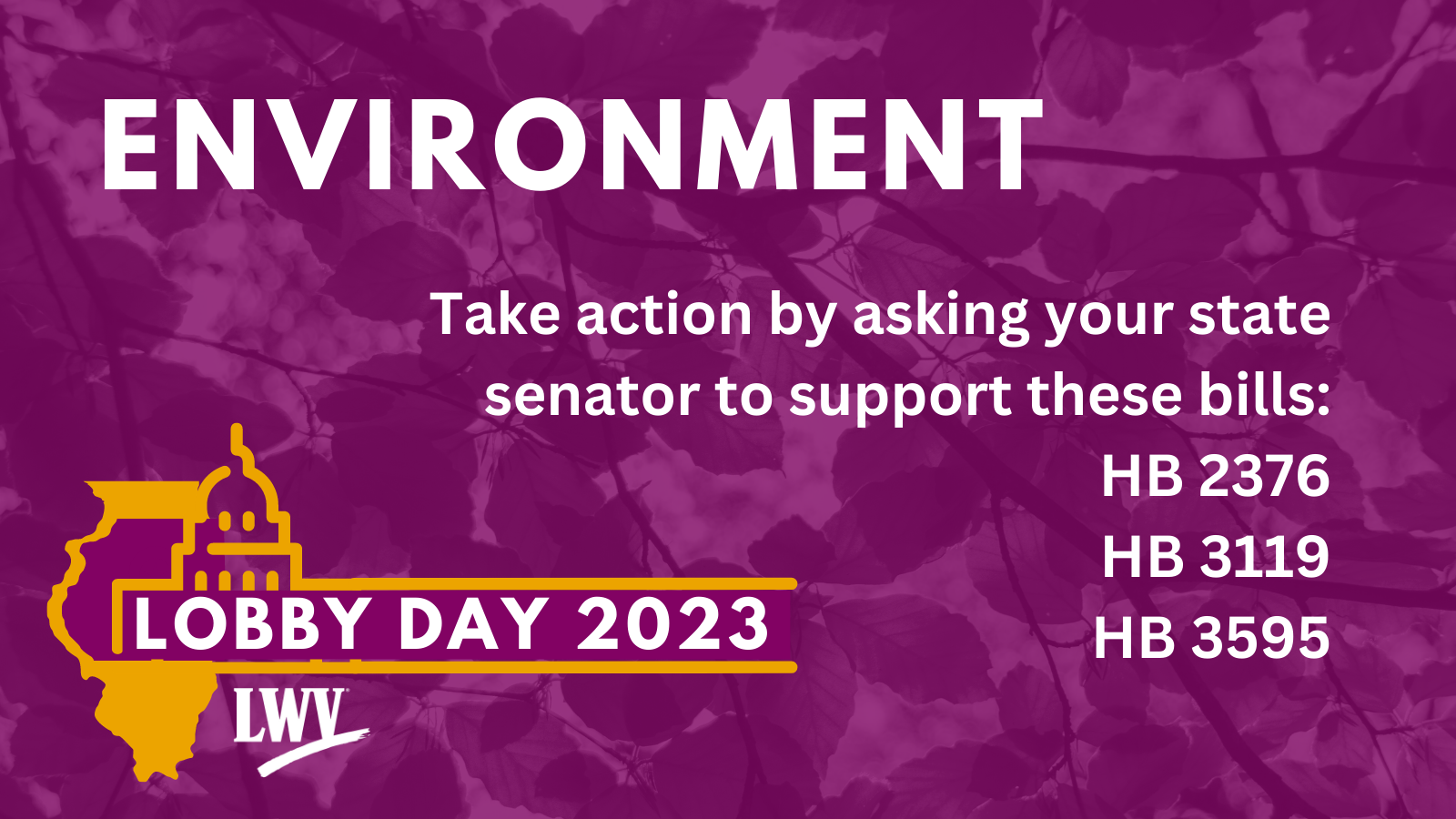Environment
Let’s work together to protect our planet
The following bills are moving through the Illinois General Assembly. They have all passed in the Illinois House and crossed to the Illinois Senate, where they need support.
HB 2376 Polystyrene Reduction
HB 3119 Carbon Dioxide Transport and Storage Protection
HB 3595 Power Plant Demolition, Transparency, and Protection
Give it five minutes
Call or email your state senator: “I am contacting you on the League of Women Voters of Illinois Lobby Day to let you know that the League supports HB2376, HB3119 and HB3595—and as your constituent, I want you to support these bills too. Help protect our planet! Please support HB2376, HB3119 and HB3595.”
Give it more time
Activate your networks
Encourage friends to contact their state senators by using these graphics for social media, emails, and texts.
Suggested copy:
Legislation to reduce single-use plastics, fight climate change, and protect public health is moving through the Illinois Senate right now! Ask your state senator to support HB2376, HB3119 and HB3595. Learn more: lwvil.org/lobbyday23 #LobbyDayLWVIL
Stop by your state Senator’s HOME Office
Drop in! Without an appointment, you might not be able to see your legislator, but you can drop off fact sheets (find them below) and maybe talk to a staffer.
What’s at stake: Learn about the bills
HB2376 Polystyrene Reduction
HB2376 creates a path forward for the elimination of polystyrene (foam) containers from the restaurant industry with reasonable expectations set for low-income businesses. Beginning January 1, 2025, a retail establishment may not sell or distribute in Illinois a disposable food service container that is composed in whole or in part of polystyrene foam.
Background: Scientists have discovered plastic pollution is pervasive around the globe and even inside our bodies. This legislation would eliminate polystyrene, which is a single-use plastic. Styrene, a building block of polystyrene, is likely a carcinogen, creating health risks in production, use, and disposal.
League Position: Consumption of nonrenewable resources should be minimized. Management of land as a finite resource not as a commodity, since land ownership, whether public or private, carries responsibility for stewardship. Land-use planning that reflects conservation and wise management of resources.
HB3119 Carbon Dioxide Transport and Storage Protection
HB3119 clarifies that the title to pore space belongs to the owner of surface land and expressly prohibits the forced acquisition of pore space (similar to eminent domain). The bill also includes minimum pipeline setbacks from buildings, funding for emergency response (and equipment), public participation, long term financial responsibility to stay with the operator and not the residents of Illinois, and a framework for long term stewardship of the sequestered CO2.
Background: Carbon capture takes the carbon dioxide from smoke stacks and pumps it into pipelines to be stored underground. It poses many risks to our state, including increased pollution at facilities attempting to capture carbon and damages caused by CO2 pipelines that would cut through communities. There are significant regulatory gaps needed to adequately protect Illinois landowners, local drinking water, public health and our climate. The provisions of HB3119 are missing or inadequate in the industry's proposed carbon sequestration bill.
League Position: The League’s environmental protection and anti-pollution goals aim to prevent ecological degradation and to reduce and control pollutants before they go down the sewer, up the chimney, or into the landfill. The League supports regulation of pollution sources by control and penalties.
HB3595 Power Plant Demolition, Transparency, and Protection Act
The Power Plant Demolition Transparency & Protection Act will provide the following:
Expand public notice and participation requirements for power plant implosions
Establish state oversight by requiring an Illinois EPA-approved Air Quality Plan
Establish new fees for power plant demolitions in violation of these rules
Background: The Climate and Equitable Jobs Act put Illinois on a path to close all coal and gas power plants by 2045. However, few regulations exist to protect community members during the demolition of those power plants. A prime example of the need for regulation occurred in 2020, with the demolition of the Crawford Generating Station smokestack in Chicago. Demolition caused a massive dust cloud to spread over the adjacent neighborhood of Little Village. Residents received a minimal warning and were sheltering in place because of the COVID-19 pandemic. The incident was the result of documented failures of both the owner, HILCO, and Chicago City officials to adequately protect Little Village residents.
Illinois Power Plant Communities Still at Risk (Prairie Rivers Network blog post)
League Position: Natural resources should be managed as interrelated parts of life-supporting ecosystems. Resources should be conserved and protected to assure their future availability. Pollution of these resources should be controlled in order to preserve the physical, chemical, and biological integrity of ecosystems and to protect public health.



